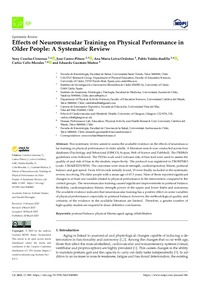Effects of neuromuscular training on physical performance in older people: a systematic review
Autor
Concha-Cisternas, Yeny
Castro-Piñero, José
Leiva-Ordóñez, Ana María
Valdés-Badilla, Pablo
Celis-Morales, Carlos
Guzmán-Muñoz, Eduardo
Fecha
2023Resumen
This systematic review aimed to assess the available evidence on the effects of neuromuscular training on physical performance in older adults. A literature search was conducted across four databases (Psychology and Behavioral (EBSCO), Scopus, Web of Science and PubMed). The PRISMA guidelines were followed. The PEDro scale and Cochrane risk of bias tool were used to assess the quality of and risk of bias in the studies, respectively. The protocol was registered in PROSPERO (code: CRD42022319239). The outcomes were muscle strength, cardiorespiratory fitness, postural balance and gait speed. From 610 records initially found, 10 were finally included in the systematic review, involving 354 older people with a mean age of 67.3 years. Nine of them reported significant changes in at least one variable related to physical performance in the intervention compared to the control groups. The neuromuscular training caused significant improvements in postural balance, flexibility, cardiorespiratory fitness, strength power of the upper and lower limbs and autonomy. The available evidence indicates that neuromuscular training has a positive effect on some variables of physical performance, especially in postural balance; however, the methodological quality and certainty of the evidence in the available literature are limited. Therefore, a greater number of high-quality studies are required to draw definitive conclusions.
Fuente
Life, 13(4), 869Link de Acceso
Click aquí para ver el documentoIdentificador DOI
doi.org/10.3390/life13040869Colecciones
La publicación tiene asociados los siguientes ficheros de licencia:


